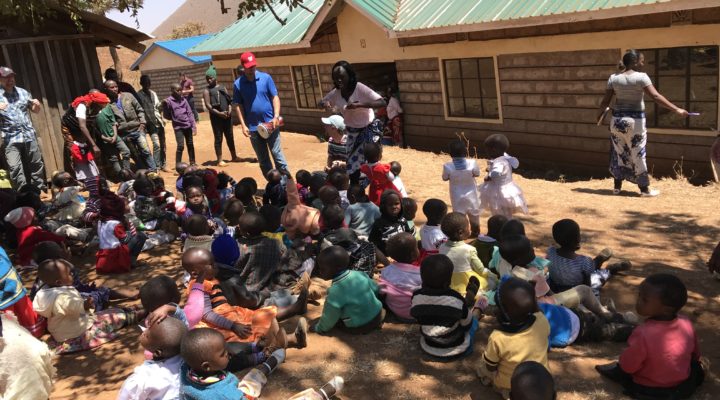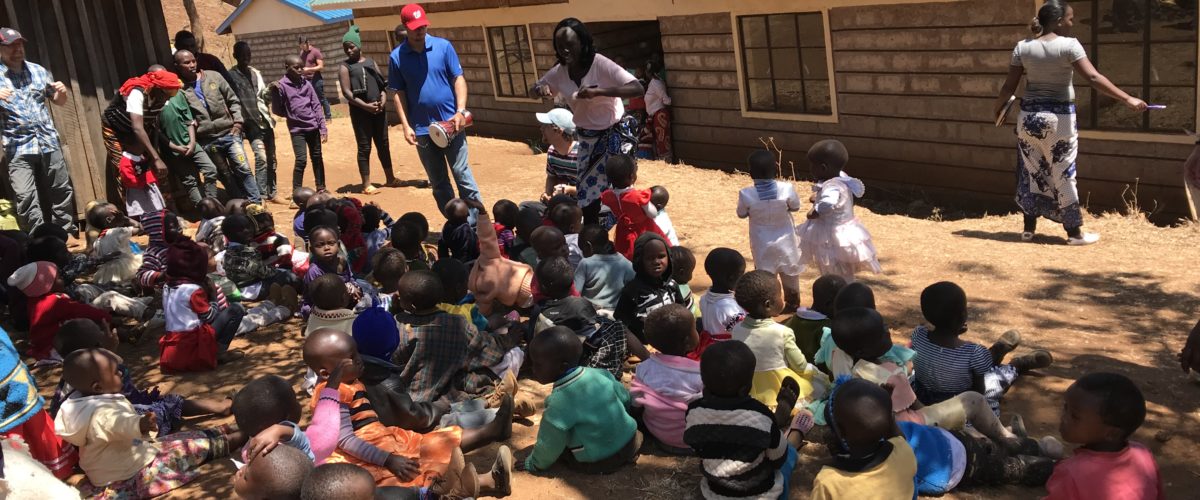Across Africa, a particular modern-day challenge confronting several countries and governments is what to do about the growing number of street children in major cities.
Whether in the south, east, central, west or north part of Africa, the problem stares one in the face: Young boys and girls who, forced into the streets by poverty or circumstances of birth in many cases, given their vulnerability and helplessness, face risks to their lives. But they also pose a danger to society in place like Nigeria where Boko Haram, the terrorist group, is known to recruit street kids to perpetrate their evil agenda.
The fate of street kids is so overlooked that a media report once referred to them as “children of nobody.”
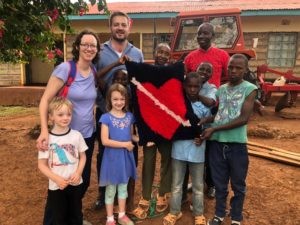 In Kenya, however, a non-government organization called Sodzo International has stepped up to take responsibility for street kids. The brain behind the organization is an American national named Michael Goodman, who also serves as executive director.
In Kenya, however, a non-government organization called Sodzo International has stepped up to take responsibility for street kids. The brain behind the organization is an American national named Michael Goodman, who also serves as executive director.
In 2012, Goodman visited Kenya, in the eastern part of Africa, as a member of a University of Texas medical team that had a partnership in the country. There, Stanley Gitari, director of community programming for the Maua Methodist Hospital, asked the question, “What do we do about children who live on the streets?”
The question had an effect on Goodman. He thought over it and felt something could be done to assist the kids. At the time, he served on the board of another organization that was going through a transition, and following consultations, he got the mandate of the board of directors to work to reconstitute its board and gain a slightly different focus.
That paved way for the birth of Sodzo International in 2014. “Through a mix of prayer, consultation, listening to sermons and encouragement by our home church — South Main Baptist Church in Houston, — we realized we were in a unique position to address this challenging question,” Goodman recalled.
Sodzo International’s mission is “to advance the well-being of the world’s most vulnerable children” and create a world “where all children possess the opportunity to discover and actualize their God-given potential.”
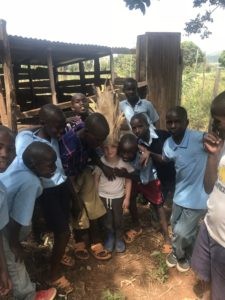 The name “sodzo” emanated from the Greek root meaning “salvation,” Goodman explained. Steve Wells, pastor at South Main, “preached a sermon on the holistic meaning of the word sodzesthe soon before our first board meeting, and we wanted to embody this meaning in our work.”
The name “sodzo” emanated from the Greek root meaning “salvation,” Goodman explained. Steve Wells, pastor at South Main, “preached a sermon on the holistic meaning of the word sodzesthe soon before our first board meeting, and we wanted to embody this meaning in our work.”
Sodzo International currently has 35 paid staff in Kenya, all Kenyans, including Gitari, who’s now the country director of the organization while still maintaining his job at Maua Methodist Hospital. A nine-member board of directors in the United States supports the organization.
“We have a few different, connected projects in Kenya,” Goodman said. “We developed a center-based intervention for children who live on the streets called the Watoto wa Ahadi (Children of Promise) Rescue Center. Through this center and directly reintegrating children with their families when possible, we have helped over 500 children find their way off the streets. We reintegrate the children with their families whenever possible and offer community empowerment to the villages where these children come from.”
A community empowerment program, called Kuja Pamoja kwa Jamii (“Come together for the place where we belong” in Swahili), uses group-based microlending to create self-help groups that then train in business/entrepreneurship, farming, positive parenting, intimate partner conflict resolution and violence prevention, early childhood development, maternal/newborn care, and water resource management.
“This program is active in 27 villages in the area we serve and has enrolled over 7,000 families in the program that meets weekly,” he noted. “We also help run or operate a few private schools and a brand-new community center for early child development.”
Sodzo International’s work in Kenya would not have been possible without the support of the Kenyan government. Not only did Kenyan authorities endorse its plan for helping street kids in the country, they also provide financial support to it.
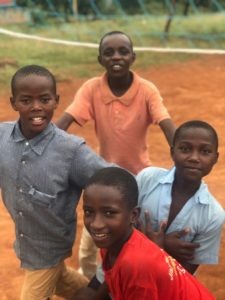 “Kenyan authorities have been wonderfully supportive of our work,” Goodman reported. “When we began addressing the issue of street-involved children in 2013, (before the establishment of Sodzo International the following year) the local government set aside their plans to round up the children and put them in detention centers. We receive funding from the national government’s Ministry of Social Protection and other forms of support from the local government.
“Kenyan authorities have been wonderfully supportive of our work,” Goodman reported. “When we began addressing the issue of street-involved children in 2013, (before the establishment of Sodzo International the following year) the local government set aside their plans to round up the children and put them in detention centers. We receive funding from the national government’s Ministry of Social Protection and other forms of support from the local government.
“Our Kenyan partners made a place for collaborative kingdom work to thrive and welcomed us to join them. We bring resources — financial, strategic planning and research skills. Our primary mission is truly to help children in the most vulnerable places of the world thrive and enjoy God’s good creation the best they are able.”
The synergy between the Kenyan authorities and Sodzo is such that “our program models have already informed the Kenya government’s approach to working with street-involved children,” Goodman said.
Sodzo International also conducts peer-reviewed research on its programs.
“We recently had a publication accepted at the peer-reviewed journal Health Promotion International that outlines our approach to community-based transformation to help vulnerable children,” he said. “Through these efforts, we seek to help others learn from our experience so they can be even more effective in their work. We are developing partnerships with other researchers, such as in Sierra Leone, to implement our models there too. In Sierra Leone, we would be working with post-conflict communities.”
Apart from the support of the Kenyan authorities, Goodman said Sodzo International’s work is made possible by a number of Baptist institutions and other donors.
“We seek to help others learn from our experience so they can be even more effective in their work.”
“We receive funding from a lot of different generous donors, the first among which is South Main Baptist Church in Houston and many of its members. We receive funding also from the Texas Baptist Hunger Offering. Wilshire Baptist Church in Dallas has previously supported us during a national drought in Kenya, during a time when food was very insecure. A Virginia Baptist church, Bonsack Baptist Church, has been a great friend and loyal supporter.”
Others include private donors, members of the board, United Methodist churches and foundations, as well as those connected with Presbyterian and Episcopalian churches, the governments of Canada and the U.S. National Institutes of Mental Health.
Since 2012, Goodman has visited Kenya about 25 times. “I typically spend two weeks there, except when I can bring my family and stay for a month. We have deep partnerships there and deep knowledge from partners in the U.S. My wife is a pediatrician, and we work with medical students from the University of Texas Medical Branch there every year. I’m on research faculty at UTMB, so we typically create research projects to work with the community there.”
Goodman earned a bachelor’s degree in religion and philosophy from Campbell University, a Baptist school in North Carolina, as well as a master’s of divinity from Candler School of Theology at Emory University. While in seminary he was ordained as a Baptist minister affiliated with the Cooperative Baptist Fellowship.
He is proud of his Baptist training as he believes it “prepared me to consider what my life values were and provided a lot of opportunities to engage in kingdom work.”
He looks forward to everyone being vaccinated so he can channel more of his time to Sodzo’s work in Kenya.
He also holds master’s and doctoral degrees in public health from the University of Texas Health Science Center in Houston. He has served as a hospital chaplain, campus minister and now as assistant professor in the Division of Infectious Diseases at the University of Texas Medical Branch in Galveston, where he has been heavily involved in the response to COVID-19 since March 2020. He looks forward to everyone being vaccinated so he can channel more of his time to Sodzo’s work in Kenya.
“The Sodzo experience has been an incredible journey and blessing,” he said. “We are at the heart of so much generosity, fellow feeling for our global neighbors and commitment to make the world a better place for our most vulnerable children.”
He quoted pastor Basil King, who once said, “Go at it boldly, and you’ll find unexpected forces closing round you and coming to your aid.”
“This is so true it fills me with emotion. We may not always get it 100% right, but we always try our hardest to be faithful, and we have truly been blessed.”
Anthony Akaeze is a Nigerian-born religion writer who currently lives in Houston. He covers Africa for BNG.
Related articles:
Despite COVID restrictions, faith-based agencies continue to improve lives in Africa
How the Ebola experience helped the African continent’s fight against COVID-19

